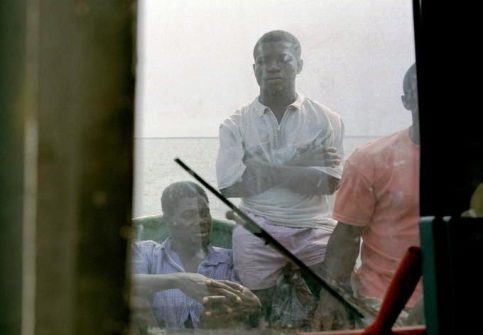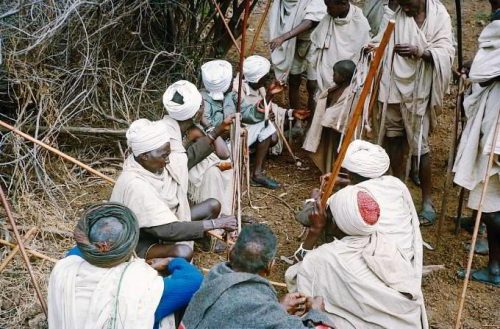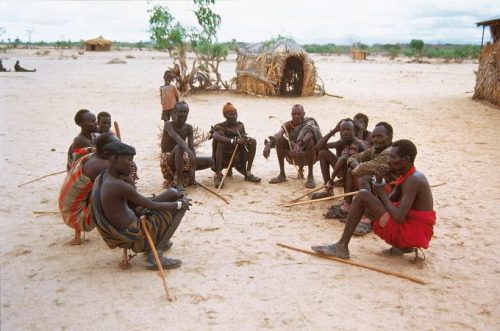The Palaver. A traditional African path to peace.

Peace depends on the community’s ability to intervene in problematic situations and resolve conflicts by re-establishing justice and truth. Every peace is built based on justice and equity and not on the annihilation of the other. The art of politics consists precisely in the ability to know how to resolve conflicts creatively without giving rise to violence and thus promoting life.
In this perspective, African ancestors invented the ‘Palaver’, a highly relevant and effective procedure today. In sub-Saharan Africa, the ‘Palaver’ best expresses the function of the word in its community dimension. Public affairs are discussed through the ‘Palaver’, conflicts are resolved, legal acts are established, etc.
From this definition emerges the popular, public character of the ‘Palaver’ as well as its purpose which is the interest of each individual and all. One can resort to the ‘Palaver’ both for matters that concern the public interest and for those of personal interests.Ultimately, an event of a fundamental community nature occurs in it that concerns order and/or community life. Thus, one could say that the ‘Palaver’ is a path of common research to find a law of social life, a lifestyle.

Kenya. Pokot. The ‘Palaver’ originates in an “infringed right” or a “disturbed order”. File swm
Given the complexity of the fields it deals with, there are also various types of ‘Palaver’: at the level of the family, the clan or the village, between villages or even between two ethnic groups; but all these contexts refer to the context of the family and the way of proceeding is always the same. Here our interest goes first of all towards that type of ‘Palaver’ that could be defined as “the reduction of a conflict through language, a humane erasure of violence through discussion”.
The origin of the ‘Palaver’ is therefore in an “infringed right” or a “disturbed order”, that is, it always starts from a complaint brought to a ruler or the community council by a member or a clan or a tribe that sees its right infringed. The complaint requires that the community be convened. The purpose of the ‘Palaver’ emerges from the very way in which the community is arranged, that is, communication, giving new life, recomposing the entire community, that is, reconciling.

Guinea Bissau. the ‘Palaver’ articulates the word as a word “given to another”. File swm
In the ‘Palaver’, the entire society itself sets out on a journey, questions itself about its references (points of reference), distances itself from violence and attempts to enter into an uninterrupted dialogue with itself and with the other in itself. It can do this only because the ‘Palaver’ articulates the word as a word “given to another”, “addressed to”, as a donation. This donation requires the donor to put it in a form that is also an articulation of meaning. It thus highlights that reconciliation can only happen as a gift, gratuitously.
It is possible only when at least one of the parties involved feels the need to give meaning to life by performing acts of gratuitousness.
In this perspective, the ‘Palaver’ also brings into play another fundamental dimension of the Word: its creativity. Everyone can speak freely and in fact, the ‘Palaver’ does not end until all participants have expressed what is close to their hearts. It is appropriate here to underline the freedom of speech of each member and of the entire assembly as well as the dialogical character that the search for truth has in the exercise of justice. In fact, not only is there dialogue in the public debate, but the very search for arguments is done in dialogue, in consultation between the groups responsible for the ‘Palaver’. In all of this, the purpose of the ‘Palaver’ is manifested, which is to put an end to conflicts through the word and its creativity.

Kenya. Borana leaders. The function of the ‘palaver’ is to ensure that a word spoken in the community is a producer of life and not of death. File swm
The failure of the ‘Palaver’ means resuming the conflict or the outbreak of violence. Therefore, a great sense of responsibility is expected from all participants in the use of the word as a revealer of the truth that creates justice. In this way, the healing function of the word is highlighted. The word is capable of producing salvation or destroying, it can build communion or destroy it. It is something effective and dynamic. The function of the ‘Palaver’ consists in ensuring that a word spoken in the community is a producer of life and not of death. This role of the word is of capital importance, given that conflicts, and the need for revenge on the part of the victim often leads them to no longer know how to manage violence, resentment, or rancour. The word placed in the context of the “Palaver” can liberate the victim.
The genesis of resentment lies in the fact that the exercise of revenge that would re-establish the offended person in the sense of his dignity, his honour, and the satisfaction to which he is entitled, is so strong that this emotion is focused on the internal imaginative expression, or even on the tendency to take revenge. It is this resentment that then translates into feelings such as hatred, jealousy, wickedness, envy and malice. Such resentment does nothing but increase the suffering endured by the victim. Such resentment debases the person and poisons his personality. The hatred hidden within the person prevents him from developing, from fulfilling himself.
Therefore, it is impossible to count on a victim who lives in resentment to build the future. Hence the need to free such individuals from their resentment through the word. Such was the strong point of the intuition of the ancestors in resorting to the ‘Palaver’.

Kenya. Turkana. In the ‘Palaver’ logic, everyone has the right to speak. File swm
In the logic of the ‘Palaver’ everyone has the right to speak. In this sense the ‘Palaver’ guarantees equality and access for all to speak with a view to the liberation of the individual and the building up of the community. The final decision reached at the end of a ‘Palaver’ process is not the result of a compromise or a vote according to the principle of the majority, but of a solid consensus among all members which allows them to glimpse the path to follow together. The ‘Palaver’ process can reach this result because in it a purification of memory takes place, a confession of one’s guilt by the aggressor and an expression of one’s resentment by the victim.
In the word, in language, liberation takes place, because in it the truth has come to light. It is typical of the ‘Palaver’ that in it the truth occurs only progressively in a long process where each of the participants expresses his opinion and his thoughts, gradually correcting and readjusting his position according to the perception of the light of truth as it manifests itself in the process of exchange. In the end, one adheres to the conclusion not because it is the expression of the majority, but because in the voice of the community, each one recognizes his voice. The ‘Palaver’ is not only a long common process of clarification in the search for truth, but above all, it is a common search for peace and communion, reconciliation with oneself and with others. (Open Photo: Maasai young people. 123rf)
(J.M.)



